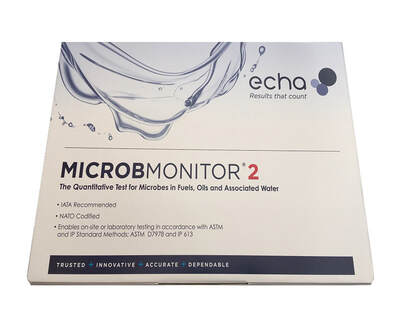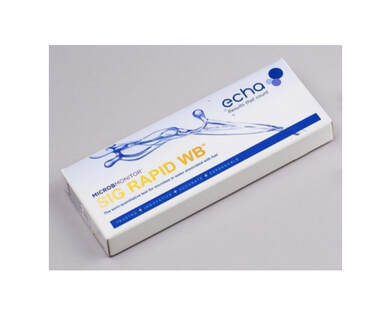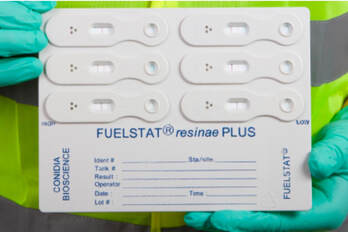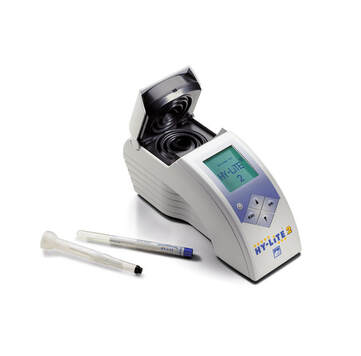Microbmonitor GMF - Microbial Culture Test Kits
The MicrobMonitor GMF (GMF = Ground & Marine Fuels) is an easy to use test kit for microbial contamination in diesel and marine fuels with simple to read, reliable results. A small sample of fuel is added into a bottle containing a specially formulated gel. The test bottle is then placed in a warm location and the number of microbial colony forming units (CFU) that develop indicates the severity of the contamination.
Each test is packed in a box including:
Tests are supplied in sleeves of 5, however there is currently an MOQ of 10 sleeves of 5, so 50 tests. For product specific documents such as Product Instructions and Material Safety Data Sheets, simply click on the Product Download links below.
Assesses the presence and extent of bacterial and fungal contamination in ground and marine fuels in storage, distribution and use, including:
Product Features:
LIFESPAN
Each test is packed in a box including:
- 1 single MicrobMonitor GMF test.
- 1 sterile sampling container.
- 1 sterile disposable dispenser for measuring fuel sample.
Tests are supplied in sleeves of 5, however there is currently an MOQ of 10 sleeves of 5, so 50 tests. For product specific documents such as Product Instructions and Material Safety Data Sheets, simply click on the Product Download links below.
Assesses the presence and extent of bacterial and fungal contamination in ground and marine fuels in storage, distribution and use, including:
- Marine Diesel & Gas oil
- Automotive Diesel & Gasoline, Including Biofuels
- Heating Oils & Fuels for Power Generation
Product Features:
- Designed for use with today’s marine and diesel fuels, including biofuels and biofuel blends.
- Optimised for simple testing with easy to understand results.
- Quick and easy to use on-site.
- All you need to take the sample and perform the test is included – no additional equipment needed.
- More economical than standard laboratory tests.
- Indicates the severity of any infection not just the presence of microbes as with “go, no-go” tests.
- Detects even at low contamination levels to give early warning of potential problems.
- Detects active growth of moulds (including Hormoconis resinae), yeasts and bacteria.
- Also detects microbial spores – these can be an important indicator of contamination status when testing fuel samples which do not contain water.
- Unaffected by biocides or other fuel additives; does not give false positives in the presence of dead microbes so can assesses the effectiveness of biocide treatments quickly.
- MicrobMonitor GMF uses the same CFU technology as laboratory standard test methods IP 385 and ASTM 6974.
- The number of CFU indicated by MicrobMonitor GMF provides an assessment of the extent of microbial contamination in the tank or system. CFU counts have been shown to provide one of the most reliable indications of tank contamination status.
- Unlike some other technologies, MicrobMonitor GMF can provide reliable indication even when no water is available for test.
LIFESPAN
- Shelf Life is 12 months from point of manufacture.
- No special storage conditions.
- DO NOT ALLOW PRODUCT TO FREEZE.
| ep066_mm2-instruction-leaflet_1308181.pdf | |
| File Size: | 6665 kb |
| File Type: | |
| evfuel_ep113_mm2quickguide2-microblab_210218.pdf | |
| File Size: | 457 kb |
| File Type: | |
| evfuel_ep124_mm2-product-data-sheet_180717.pdf | |
| File Size: | 220 kb |
| File Type: | |
Your browser does not support viewing this document. Click here to download the document.
ECHA Microbiology- SIG Rapide WB- Microbial Presence Test Kits
ECHA Microbiology, SIG Rapide WB, Microbial Presence Test Kits
FOR RESULTS IN 1 HOUR @ 35°c APPROXIMATELY
The Sig Rapid WB™ test is design to detect the levels of microbes typically found in water associated with fuel and is not designed to test fuel directly. To test a fuel phase sample directly please use the MicrobMonitor2 test.
Microbial proliferation cannot occur in fuel without the presence of some free water. The microbes first develop in this water and later spread into the fuel. Few fuel systems with water associated with them are completely free of micro-organisms but the level of sensitivity of the test is such that normal and acceptable levels of microbial contamination are not detected. A positive result in the test indicates an abnormal level of microbial contamination in the water tested and by implication strongly suggests unacceptable microbial proliferation in some of the fuel/water system sampled. Conversely a negative result in the test strongly suggests that the fuel/water system sampled will be unlikely to be operationally affected by microbial spoilage. Microbes in large volumes of fuel tend to settle towards the bottom water and are detectable by the Sig Rapid WB™ test. Upper fuel may then not be heavily infected, however, movements of fuel will probably disturb and redistribute bottom contamination.
The Sig Rapid WB™ test is designed to detect microbial contamination in water phase when active proliferation has begun. It is not designed to detect the normal background levels of microbes present in water associated with fuel. Therefore it will not give a strong positive result if microbes are not actively multiplying and growing on the fuel which the water is associated with.
The shelf Life of the test is 6 to 12 months dependant on storage conditions. 12 months when stored frozen, 6 months when stored in a cool dark room or refrigerated.
The Sig Rapid WB™ test can be used to test;
Product Features:
TRUSTED
Sig Rapid WB™ enables rapid testing of water associated with fuel. Providing reliable results and indicating the presence of microbial contamination.
INNOVATIVE
The test utilizes the enzymes that the microbes produce to indicate their presence. The enzyme causes a colour change within the test within 1 hour.
ACCURATE
Sig Rapide WB™ is a semi-quantitative test which indicates the level of microbial contamination present in water associated with fuel.
DEPENDABLE
The test detects the enzyme produced by a wide range of microbes when growing in a fuel tank environment. The test can rapidly indicate when a microbial contamination problem is present in the water associated with fuel.
FOR RESULTS IN 1 HOUR @ 35°c APPROXIMATELY
The Sig Rapid WB™ test is design to detect the levels of microbes typically found in water associated with fuel and is not designed to test fuel directly. To test a fuel phase sample directly please use the MicrobMonitor2 test.
Microbial proliferation cannot occur in fuel without the presence of some free water. The microbes first develop in this water and later spread into the fuel. Few fuel systems with water associated with them are completely free of micro-organisms but the level of sensitivity of the test is such that normal and acceptable levels of microbial contamination are not detected. A positive result in the test indicates an abnormal level of microbial contamination in the water tested and by implication strongly suggests unacceptable microbial proliferation in some of the fuel/water system sampled. Conversely a negative result in the test strongly suggests that the fuel/water system sampled will be unlikely to be operationally affected by microbial spoilage. Microbes in large volumes of fuel tend to settle towards the bottom water and are detectable by the Sig Rapid WB™ test. Upper fuel may then not be heavily infected, however, movements of fuel will probably disturb and redistribute bottom contamination.
The Sig Rapid WB™ test is designed to detect microbial contamination in water phase when active proliferation has begun. It is not designed to detect the normal background levels of microbes present in water associated with fuel. Therefore it will not give a strong positive result if microbes are not actively multiplying and growing on the fuel which the water is associated with.
The shelf Life of the test is 6 to 12 months dependant on storage conditions. 12 months when stored frozen, 6 months when stored in a cool dark room or refrigerated.
The Sig Rapid WB™ test can be used to test;
- Fuel tank water bottoms
- Product in shore tanks before loading on ships
- Compartment bottoms in a loaded tanker prior to discharge
- Stored product in tank farms
- Garage forecourt automotive diesel tanks
- Private diesel/gas oil/heating oil tanks
- Road tankers
- Ships bunkers (storage tanks, day/service tanks)
- Standby generator fuel tanks
- Drain samples from tanks, filters, centrifuges and coalescers
- Slops/slime in empty ships or shore tanks before they are used for product
Product Features:
- Quick, easy and safe to use
- Results available after 1 hour @ 35c
- Simple to read results
- Results are semi-quantitative and give an indication of the severity of an infection
- Cost effective method of monitoring for microbial contamination in water associated with fuel
- An enzyme based test kit, which is much faster than culture test methods
- A small incubator can be used to incubate the tests. The test is so small that individual tests can be incubated in a pocket close to your body.
TRUSTED
Sig Rapid WB™ enables rapid testing of water associated with fuel. Providing reliable results and indicating the presence of microbial contamination.
INNOVATIVE
The test utilizes the enzymes that the microbes produce to indicate their presence. The enzyme causes a colour change within the test within 1 hour.
ACCURATE
Sig Rapide WB™ is a semi-quantitative test which indicates the level of microbial contamination present in water associated with fuel.
DEPENDABLE
The test detects the enzyme produced by a wide range of microbes when growing in a fuel tank environment. The test can rapidly indicate when a microbial contamination problem is present in the water associated with fuel.
| ep019_160516_echa-sig-rapid-wb-instruction-leaflet_1_.pdf | |
| File Size: | 1122 kb |
| File Type: | |
Fuelstat Resinae Plus and Diesel Plus-Microbial Load Analysis Kits for Diesel and Aviation Fuels
- Fuelstat Resinae Plus and Diesel Plus, Microbial Load Analysis Kits for Diesel and Aviation Fuels
- FOR RESULTS IMMEDIATELY
There are a number of different types of micro-organisms that can grow in certain types of fuel. The biggest problem is presented by a lamentous fungus called Hormoconis Resinae (H Res). Previously called Cladosporium Resinae, and more commonly referred to as “Jet Fuel Fungus” or "Diesel Bug".
H Res is a fungus that thrives in fuel. It requires only a minimal amount of water content in the fuel to grow and will cause filter blockages, contents gauging errors due to the fouling of sensors, and corrosion damage to tanks, pipework, pumps and meters if left unchecked. Bacteria and other types of fungi, particularly some yeasts can also cause problems in fuel tanks, usually acting as a consortium.
The objective of the test is to provide rapid screening of fuel samples (water in fuel or fuel only), giving a quick and accurate assessment of H Res, bacteria & other fungi including yeasts in the fuel tank. This test is unlike current growth-based tests, which require a minimum of 72 hours to provide any results. The test measures the amount of active growth in the sample and provides actions and alert levels.
The FUELSTAT® Resinae PLUS and FUELSTAT® Diesel PLUS tests measure the amount of different types of contamination: H Res, bacteria and fungi actively growing in the sample and reports that as the weight of material in the sample. This is a newer, more accurate measurement system than the old Colony Forming Unit (CFU) count. - The test provides results based on a traffic light scenario:
- Negligible (green) – negligible contamination
- Low Positive (amber) – moderate contamination
- High Positive (red) – heavy contamination
- SIX DEVICES ARE INCLUDED IN EACH TEST (and 8 tests are included in each kit):
- Right side of paddle (LOW) 3 devices with cut off levels for H Res, bacteria and fungi at a level derived from IATA Guidance Material where the microbes have established themselves as a consortium and a fuel treatment is required.
- Left side of paddle (HIGH) 3 devices with cut off levels for H Res, bacteria and fungi at a level derived from IATA Guidance Material where the microbes are growing so rapidly, or have been growing for a long time that they may be causing damage to the structure of the tank or are likely to cause filter blockage and component failure and a tank clean and fuel treatment are required.
- TEST CONTENTS:
Each heat sealed foil pouch contains a Paddle with desiccant sachet and pipette in one section and Sample Extraction Bottle with flat cap, dropper cap and instructions for use in the other section. - Paddle: Plastic base with 6 lateral flow devices affixed
- Preparation Bottles: 175ml plastic bottle with flat cap and “dropper” cap containing 3.0ml of Sample Extraction Liquid
- Disposable, single use, plastic pipette
- Instruction leaflet
- FUEL HUSBANDRY
Rather than treat contamination when significant operational or fuel quality problems arise it is better to prevent microbial growth occurring, much can be done to ameliorate problems associated with microbial contamination in fuels, these include: - Allowing fuel deliveries to settle in the tank for 24 hours before putting the tank back into service.
- Drain any accumulated water from the bottom of the tank weekly.
- Routinely test bottom samples for microbial contamination.
- Treat fuel if required, according to test results.
- STORAGE AND STABILITY
- No special transport precautions
- Store below 30°C, but no special storage precautions otherwise
- Use between 10°c and 30°C
- Do not use after the stated expiry date, expiry date is 24 months from the date of manufacture, we aim to deliver with at least 12 months of the lifespan still intact. If longer is required please advise.
- Long term freezing is not recommended
- Why Use FUELSTAT®?
- FUELSTAT® complies with ASTM D8070-16. This enables users to rapidly test on-site and provide closer adherence to ASTM D6469
- ASTM D6469 – 14, Para 8.5, Standard Guide for Microbial Contamination in Fuels and Fuel Systems section states: Samples for Microbiological testing should be kept on ice for transport to the laboratory. Tests should be performed within 4 h and no later than 24 h after sampling. Samples stored at higher temperatures, or for longer times, can show the presence of microbial contamination that does not represent actual fuel system conditions.
- British Standards Institute BS 5410-3:2016, Testing of Fuel within Standby Generators Section 18.10 Fuel Filtration – Filters states: 1) There should be a fuel polishing system to help maintain the fuel quality, if there is no polishing system the fuel should be tested every three months. 2) Fuels for emergency generators should be tested every six months for quality and suitability.
- Since the introduction of Biodiesel (FAME) the quality and life expectancy of diesel fuels has been adversely affected. FAME is hydroscopic so a portion of the water in the fuel goes into suspension. This water can lead to injector pump damage and facilitate the growth of bacteria which blocks conventional filters.
- FUELSTAT® does not have any special handling, transportation, storage or disposal requirements.
- FUELSTAT® does not require any special skills or capital equipment
Your browser does not support viewing this document. Click here to download the document.
| conidia_bioscience_brochure_05_cbs6166.pdf | |
| File Size: | 5407 kb |
| File Type: | |
| fuelstat_diesel_plus_datasheet.pdf | |
| File Size: | 858 kb |
| File Type: | |
| fuelstat_distributor_brochure_fw786_v6.5b.pdf | |
| File Size: | 3898 kb |
| File Type: | |
| fuelstat_resinae_plus_datasheet.pdf | |
| File Size: | 961 kb |
| File Type: | |
HY-LiTE 2 Luminometer- ATP Test System
HY-LiTE 2 Luminometer, ATP Test SystemThe HY-LiTE® test system provides an easy-to-use, rapid and reliable method to assess the quality of cleaning processes in food and beverages production plants. It quantitatively measures ATP (adenosine tri-phosphate), which can be found in all biological residues, by specific reaction with a luciferin / luciferase reagent in a buffered solution. The emitted bioluminescence is detected by the HY-LiTE® luminometer. Opinion leaders consider the detection of ATP a tried and tested method for cleanliness monitoring according to the HACCP concept applied widely within the food industry.
HY-LiTE® is available in formats for the testing of surfaces, process water such as cooling water as well as diesel and kerosene fuels, and Jet-A1 / Jet-A. It provides quantitative results that can be printed or documented on a PC, and it is compliant with DIN 10124.
HY-LiTE® is available in formats for the testing of surfaces, process water such as cooling water as well as diesel and kerosene fuels, and Jet-A1 / Jet-A. It provides quantitative results that can be printed or documented on a PC, and it is compliant with DIN 10124.
- Fast: The result is available directly, so that corrective measures can be initiated immediately, where necessary.
- Mobile: The HY-LiTE® luminometer is an analytical instrument that is easy to operate and independent of laboratory equipment. The built-in temperature compensation feature is designed to ensure accurate results.
- Reliable: The system’s HY-LiTE® pen, a ready prepared cuvette plus stick for sample taking, makes use of an integrated dilution step, unlike similar products from other manufacturers. Thus, results are more reliable because false results owing to residual disinfectants are prevented.
- Surface monitoring
- CIP water testing
- Hygiene monitoring
- Fuel testing
- Metal working fluids
- Biocide efficacy testing
- Paint testing
- Quality assurance
- E-Coat testing
- Fast and convenient operation
- Fully HACCP enabled and able to load your full HACCP plans onto the instrument
- Full user history for easy operation and record-keeping
- No annual calibration required
- Compressed gas adaptor
- Fail-safe design
- Integrated temperature compensation for repeatable results
Your browser does not support viewing this document. Click here to download the document.
| 130100_hy-lite_2_system.pdf | |
| File Size: | 28 kb |
| File Type: | |
| 130102_hy-lite_pens.pdf | |
| File Size: | 36 kb |
| File Type: | |
| 130194_hy-lite_free_atp_pens.pdf | |
| File Size: | 13 kb |
| File Type: | |




